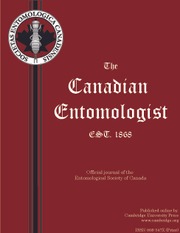No CrossRef data available.
Article contents
ABDOMINAL BLOAT — AN UNUSUAL SYMPTOM OF SYNTHETIC PYRETHROID POISONING IN ADULTS OF MAMESTRA CONFIGURATA (LEPIDOPTERA: NOCTUIDAE)1
Published online by Cambridge University Press: 31 May 2012
Extract
During a study of the effects of insecticides on cyclic nucleotide metabolism it was observed that moths (Mamestra conjgurata Wlk.) treated with the pyrethroids permethrin and deltamethrin often had grossly bloated abdomens several hours after treatment.
Two- to three-day-old moths were obtained from a laboratory culture of the bertha armyworm, M. configurata, reared on an artificial diet (Bucher and Bracken 1976). Initially, males and females were treated topically with insecticide in 5 μl of acetone applied to the thorax, head, or abdomen. Pyrethroid-treated moths developed abdominal bloat independent of the site of treatment, therefore the thorax was chosen for treatment. Treated moths were held at 20°C and examined twice daily for 3 days to determine the incidence of bloat and mortality.
- Type
- Articles
- Information
- Copyright
- Copyright © Entomological Society of Canada 1982


